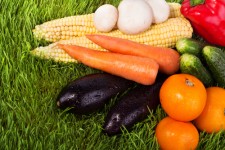 What next? Now WebMD, supposedly a source of sound, scientifically valid health information, seems to have thrown its hat into the ring with the Natural Resources Defense Council, a well-known food scares factory. The health blog is now listing which foods savvy consumer should buy organic, and which ones are OK in their conventional forms. What's the difference? Pesticides, of course.
What next? Now WebMD, supposedly a source of sound, scientifically valid health information, seems to have thrown its hat into the ring with the Natural Resources Defense Council, a well-known food scares factory. The health blog is now listing which foods savvy consumer should buy organic, and which ones are OK in their conventional forms. What's the difference? Pesticides, of course.
Of 29 different foods (mostly fruits and vegetables) listed, WebMD advises consumers to buy the organic versions of 17 to reduce the risk of consuming pesticides. This, even though on the NRDC website one of its leading members says “The kind of pesticides found in fruits and vegetables are water soluble so they come out in your urine.” Further, they advise washing them with water to reduce the "risk" even more. We would certainly agree that all fruits and vegetables, organic or not, should be washed before consumption — but not because we're worried about pesticides. We're much more concerned about possible bacterial contamination, which has been the cause of much foodborne illness.
It's interesting that one of the foods — papaya — WebMD says is OK in its conventional form likely can't be organic. It's been genetically engineered to counter a virus that destroys the fruit (and almost destroyed the Hawaiian papaya industry).
Anyway, the foods that WebMD says are OK seem to be those which have thick skins that are discarded before consumption — bananas and pineapple, for example. Although they do say that to be really safe, these can be washed before peeling. There is a germ of reality in that advice, since at least one outbreak of foodborne illness was linked to cantaloupes that were contaminated in the field. Then the surface bacteria were transferred to the inside of the fruit when they were cut.
So we agree with good food hygiene, but not with scaring consumers into paying more but not getting any better nutrition or safety — there has been no evidence that the traces of pesticides found on produce have any impact on human health. Further, no one seems to be concerned about those pesticides that are approved for use on organic foods — and yes there are some.
We'll start paying attention to pesticide-linked alerts when all pesticides, not just synthetic ones, are included. Until then, save your money, buy conventional produce, and wash everything before consumption.



